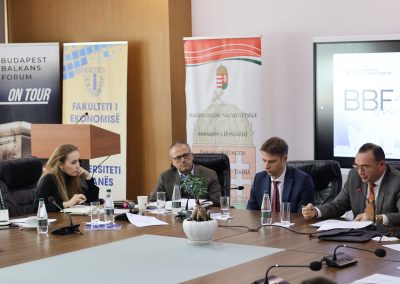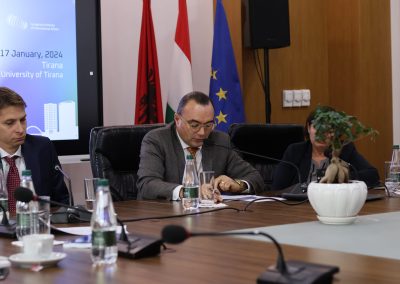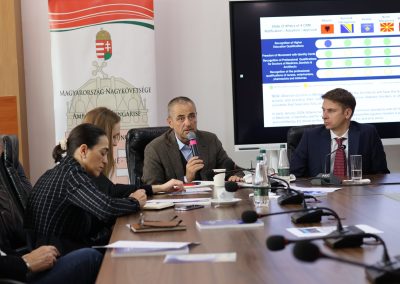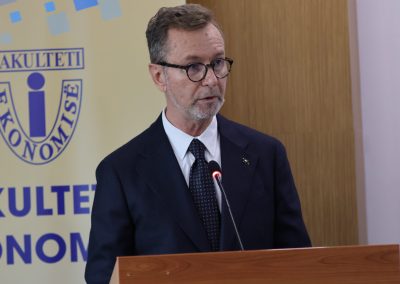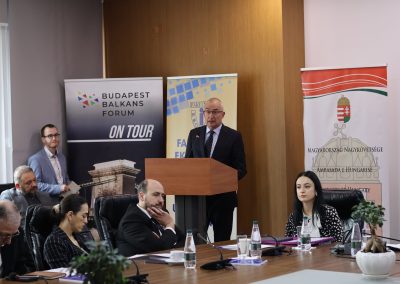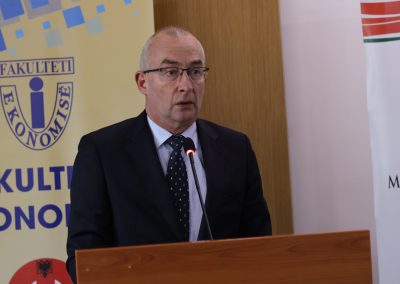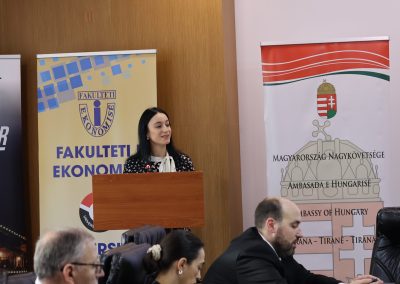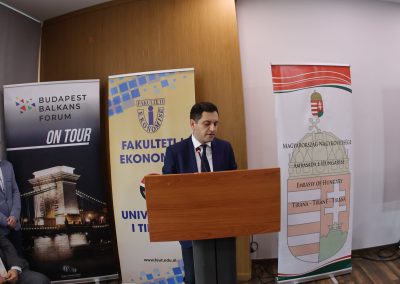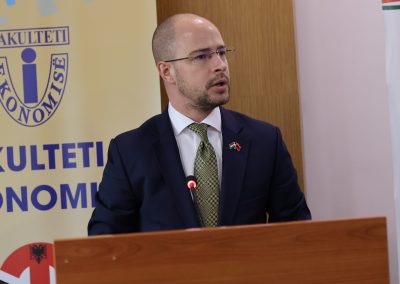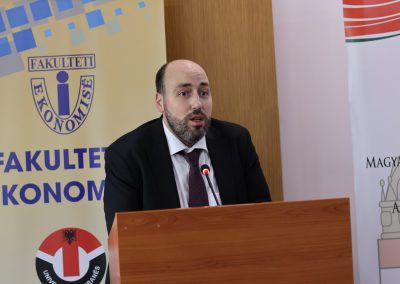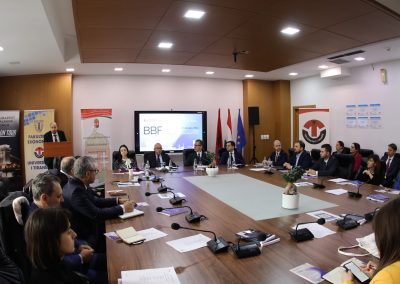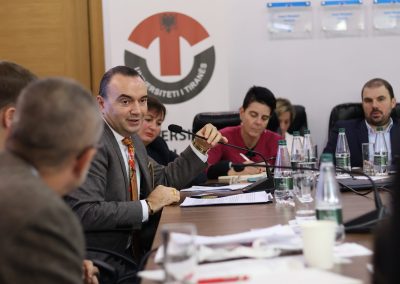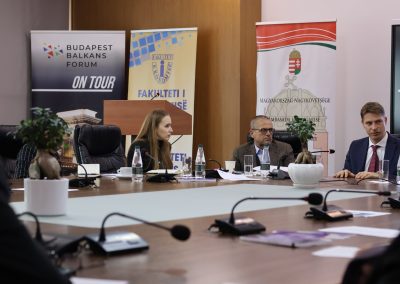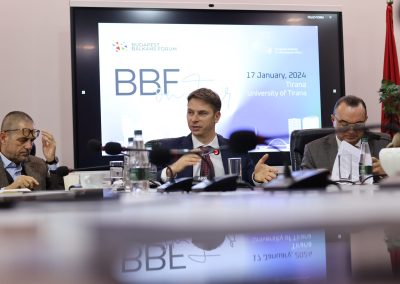The Budapest Balkans Forum on Tour (BBF On Tour) program series of the Hungarian Institute of International Affairs (HIIA) continued in Tirana on 17 January 2024. The event, entitled “Brussels Calling: Road to the Single Market” featured keynote speeches by H.E. Péter Sztáray, State Secretary for Security Policy and Energy Security of the Ministry of Foreign Affairs and Trade of Hungary; H.E. Megi Fino, Deputy Minister of the Ministry for Europe and Foreign Affairs of Albania; and H.E. Silvio Gonzato, Head of Delegation, Delegation of the European Union in Albania. The speeches were followed by an expert-level panel discussion featuring speakers from Albania and Hungary; the conversation centred around economic convergence in the accelerated EU integration process.
In his opening remarks, Tamás Péter Baranyi, Director for Strategy of HIIA introduced the Budapest Balkans Forum (BBF) as the signature conference of HIIA. Mr. Baranyi pointed out that the BBF as well as the BBF on Tour – which aims the bring our flagship conference to all Western Balkans’ capitals – underline that the Western Balkans is a Hungarian foreign policy priority. Ádám Lovassy, Chargé d’affaires ad interim of the Embassy of Hungary in Tirana continued that thought, expressing the importance of the region which will have a prominent role during the upcoming Hungarian EU Presidency. Professor Bernard Dosti, Vice Rector of the University of Tirana also welcomed the guests and outlined his expectations regarding Albania’s entry into the Single Market.
In her keynote address, Deputy Minister Fino stressed that it is essential to discuss the EU enlargement to the Albanian audience, which is also a decade-long sense of belonging for citizens. Economic integration is not only the foundation of the EU but the driving engine in the integration process. Moreover, it can be perceived as an effective tool for prosperity and regional cooperation. As the Deputy Minister stated, EU integration is a strategic priority for Albania, and joining gradually the EU – first to the Single Market – is considered as a significant opportunity. She argued that the New Growth Plan for the Western Balkans is an ambitious plan that can improve economic convergence and support fundamentals, which is even more important now as the GDP gap is growing between the EU and the Western Balkans.
State Secretary Sztáray stated that the BBF on Tour event is organised at a symbolic place as Albania has become the driving force of political talks about EU integration in 2023. In his speech, Mr. Sztáray stressed that gradual integration is an attractive tool to move on fast with the integration process. Although Hungary is in favour of this option, it cannot, however, be an excuse for prolonging the accession process of candidate countries. Budapest remains a vocal and staunch supporter of the region, having realized the political, geopolitical, security and economic interests of accession, the enlargement towards the Western Balkans will be a priority of the Hungarian EU Presidency, drawing upon the success of closing accession negotiations with Croatia during the previous Hungarian EU Presidency in 2011. The State Secretary announced that as a testament to Hungary’s interest in the Western Balkans, there is going to be the EU–Western Balkans Summit in Budapest in October.
H.E Gonzato also started his keynote speech with the fact that Tirana has become the leading place for EU talks and economic cooperation over the past year; it is now high time to turn political attention to tangible results. Echoing State Secretary Sztáray, Mr. Gonzato expressed his conviction that enlargement process should remain a credible, merit-based project, however at the same time, the partnership with the Western Balkans should be accelerated in the new geopolitical context. In this regard, the New Growth Plan for the Western Balkans means new incentives for the region to boost the required enlargement reforms by bringing some of the benefits of integration to the candidate countries.
Following the keynote speeches, the expert-level panel discussion featured Ardian Hackaj, Research Director of the Cooperation and Development Institute; Irena Malolli, Director of Policies and Development Strategies for Telecommunications and Posts of the Ministry of Infrastructure and Energy of Albania; Lulzim Rafuna, President of the Managing Board of the Western Balkans 6 Chamber Investment Forum; and Pál Zarándy, Group Chief Strategy Officer, Mobile & 5G of 4iG. The discussion was moderated by Julianna Ármás, Research Fellow of HIIA.
Ardian Hackaj underlined that the Common Regional Market is an evolving and constructive framework for cooperation. He gave the positive example of the ratification of the mobility agreements, highlighting that Albanian graduates from higher education institutions of holistic studies are now recognised not only in the Western Balkans but also in the EU (thus regional mobility is extended to the whole EU). On the New Growth Plan for the Western Balkans, Mr. Hackaj pointed out that the European Commission has learnt from the mistakes made in the Economic and Investment Plan and is doing a better job at communicating the Plan’s existence, objectives and added values. He stressed that, although the objectives and priorities of the announced financial package are notable, the size and composition of the envelope is modest, with only €2 billion of the €6 billion being non-reimbursable aid. The principle of solidarity, which is one of the founding and cohesive ideas of the EU, should also be better applied to the Western Balkans, without which no real progress can be expected.
In addition to presenting 4iG, Pál Zarándy highlighted the telecommunications company’s regional ambitions. Integration is in the company’s genes, as it links several areas in its activities. In its regional investments (Montenegro and Albania), 4iG focuses on the integration of national networks, regional integration and the integration of the EU and the Western Balkan telecom markets, and makes its business decisions on this basis. Thus, owing to the investments in Albania, the network now provides Scandinavian quality internet. Mr. Zarándy also added that the Western Balkans–EU Roaming Declaration was signed on 6 December 2022, which has significantly reduced roaming costs from October 2023 and will continue to do so, which helped Albania to be considered as a driver for the region in the business environment.
Illustrating the work of the public administration, Irena Malolli said that in this area, economic operators and the state do not work together out of necessity, but there is a lot of learning and positive interaction. A good market environment and regional construction requires an understanding of the industry so that regulation, licensing and strategies can act as incentives. Ms. Malolli stressed that the most important element in joining EU programmes (which unfortunately is not always achieved) is reciprocity.
Lulzim Rafuna said that EU integration and economic convergence are not just a political slogan but represent clear economic interests. At the level of companies, this integration is a reality, although existing barriers are a serious competitive disadvantage for the Western Balkan economic operators. The lack of freedom of movement represents a considerable cost disadvantage in monetary terms. The European internal market of almost half a billion citizens is an attractive goal, but it is still more difficult to reach under the current conditions.

